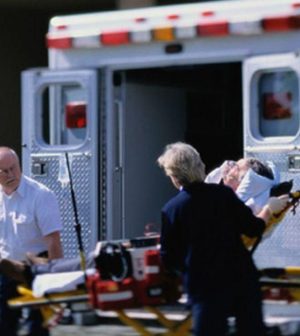- Recognizing the Signs of Hypothyroidism
- 10 Strategies to Overcome Insomnia
- Could Artificial Sweeteners Be Aging the Brain Faster?
- Techniques for Soothing Your Nervous System
- Does the Water in Your House Smell Funny? Here’s Why
- Can a Daily Dose of Apple Cider Vinegar Actually Aid Weight Loss?
- 6 Health Beverages That Can Actually Spike Your Blood Sugar
- Treatment Options for Social Anxiety Disorder
- Understanding the Connection Between Anxiety and Depression
- How Daily Prunes Can Influence Cholesterol and Inflammation
ER Visits for Heart Attacks Rebounded After Pandemic Decline

Emergency care for heart attacks and strokes rebounded in Northern California after initially plummeting in the early stages of the COVID-19 pandemic, researchers say.
That’s good news, suggesting that public health campaigns urging people to seek care if they had signs or symptoms of a stroke or heart attack were effective, according to the Kaiser Permanente researchers.
For the study, the investigators analyzed weekly numbers for adults hospitalized in the Kaiser Permanente of Northern California system with a heart attack or suspected stroke from Jan. 22, 2019 through Jan. 18, 2021.
The researchers compared rates during three COVID-19 surges — spring (March 10 to May 4, 2020), summer (June 23 to Aug. 17, 2020) and winter (Nov. 3, 2020 to Jan. 8, 2021) — to the same weeks in the preceding year.
Weekly rates declined during the initial surge, then recovered to 2019 rates. During the subsequent and much larger COVID-19 surges, hospitalization rates for heart attacks were stable, the findings showed.
There was a small but statistically significant decline in care for suspected strokes during the summer surge, but rates rebounded and did not drop during the largest winter surge, according to the report published June 2 in the Journal of the American Medical Association.
“In May 2020, we reported that, in the early months of the pandemic, the weekly number of patients admitted to our hospitals for a heart attack fell to nearly half of what would be expected,” said lead author Dr. Matthew Solomon, a cardiologist and physician researcher.
That study was published in the New England Journal of Medicine.
“This follow-up study suggests that we were successful in our efforts to reassure patients that it was important to leave their homes and seek emergency care if needed, and that they could do so safely,” Solomon said in a Kaiser Permanente news release.
The goal is to stamp out heart disease, he added.
“But until then, we want to ensure patients do not delay in seeking needed care,” Solomon said.
More information
The Mayo Clinic has more on getting emergency care during the COVID-19 pandemic.
SOURCE: Kaiser Permanente, news release, June 2, 2021
Source: HealthDay
Copyright © 2026 HealthDay. All rights reserved.










